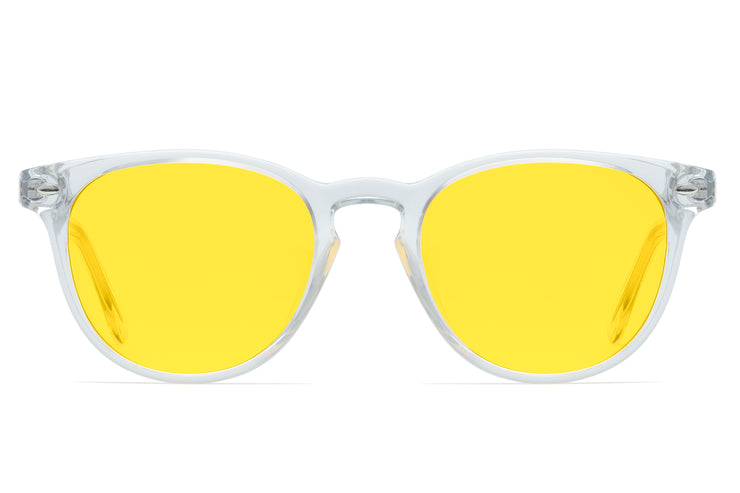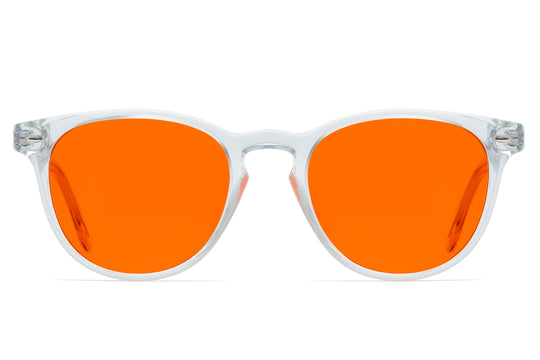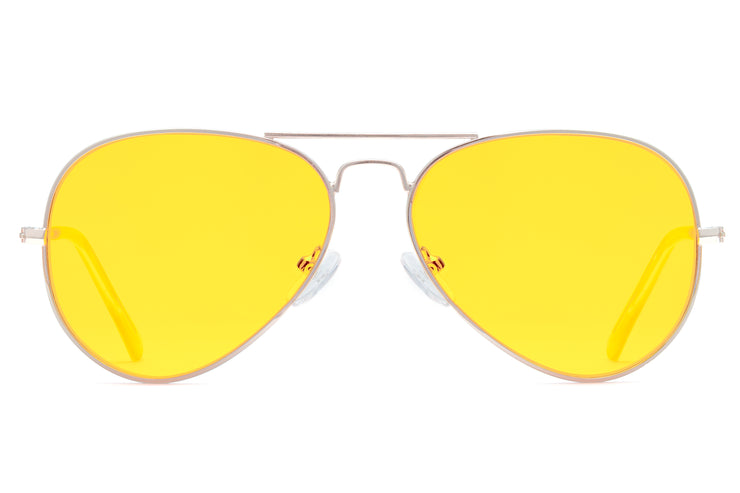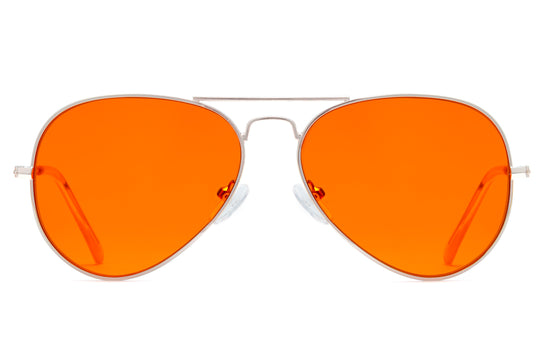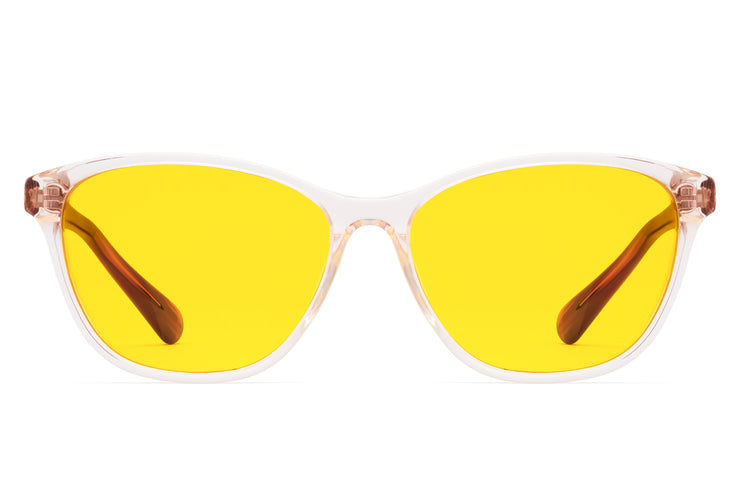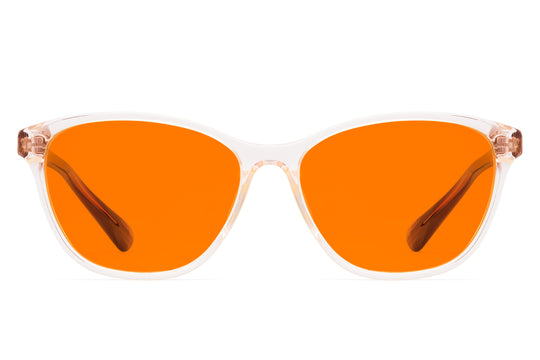
DAYTIME GLASSES
Our patented blue light glasses technologies ensure optimal blue-light protection, whenever you need it. During the day, our yellow-tinted lenses screen 100% of the harmful 455nm blue wavelengths encountered at work and in the home.
NIGHTTIME GLASSES
Once the sun goes down, our orange-tinted lenses enhance the coverage to include green light up to 550nm. Together, these lenses ensure the most complete range of protection — without ruining your ability to distinguish color.

Trending Right Now
Benefits of Blue Free Optical Lenses


Blue Free Optical proprietary daytime lenses use patented technologies to block 100% of the blue light up to the 455nm range emitted by digital devices and ambient home lighting. Then, our nighttime lenses provide increased protection once the sun goes down. This two-part solution makes Blue Free Optical the most effective blue light filter glasses on the market.

Enjoy the full spectrum of color, without the blue. Natural pigments of Melanin built right into our lenses filter out damaging blue light, while still allowing you to see the rest of the color spectrum with crystal clarity.

Durable, heat-resistant, hypoallergenic, and easy to clean, all of our frames are handcrafted from the strongest premium cellulose acetate. Blue Free Optical blue light glasses look great, and are as tough as they are effective.

Unlike many other blue light glasses which use traditional lenses coated in a blue filtering resin and offer only limited protection, our lenses contain synthetic melanin as an integral component. This means better color perception and optimal blue filtration.
What Sets Blue Free Optical Apart
THE TWO-PART SOLUTION
The human body is a complex thing, and it responds differently to blue light during the day than it does after sunset. That means that you need more blue light protection in the evening than you do during the day.

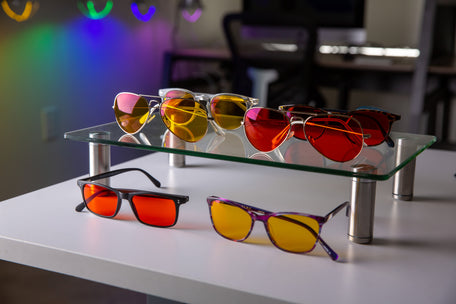
The Science Behind the Solutions
We live in a world of screens. From the computers in our homes and offices, to the mobile devices in our pockets, we’re spending more time staring at digital screens than ever before. In fact, according to a recent Nielsen Total Audience Report, the average American adult spends nearly 12 hours — well over half of the waking day — interacting with digital screens.
Unfortunately, so much screen time can have a negative effect on our health — in the form of damaging blue light.
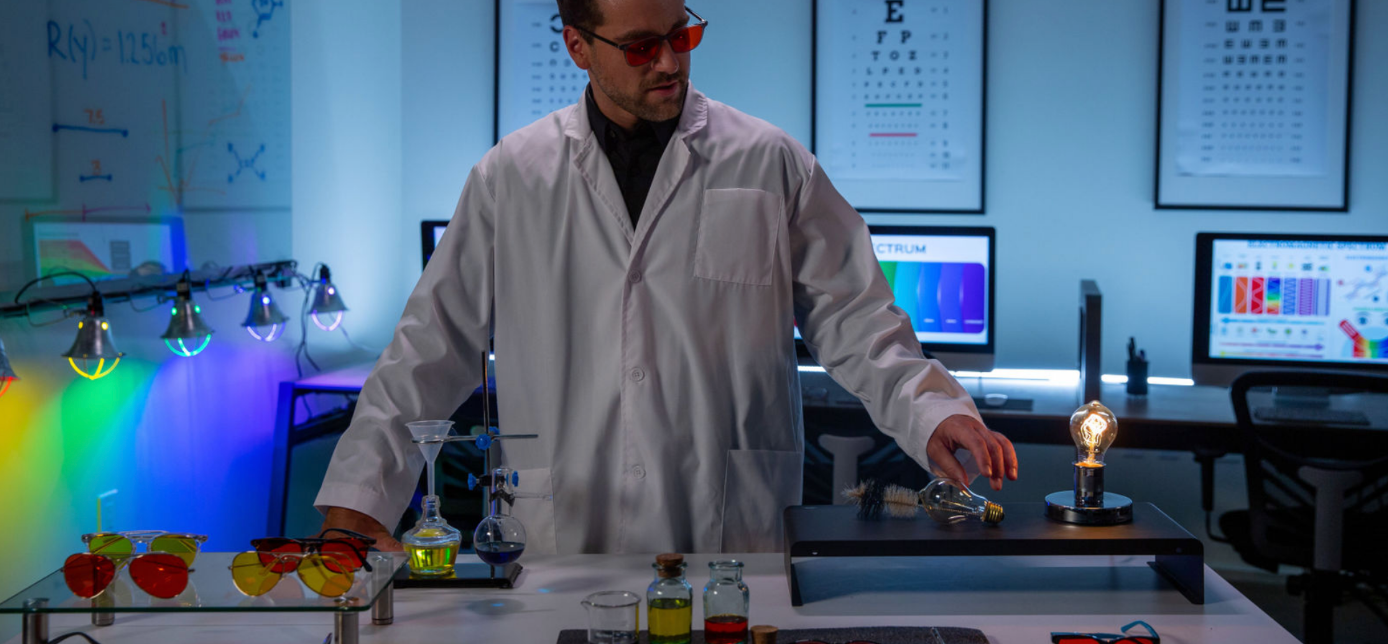
In-depth, ongoing scientific research is illuminating the dangers of blue light exposure. From disrupting circadian sleep rhythms and suppressing the body’s natural melatonin production, to hampering mitochondrial repair and increasing oxidative damage to your cells, the hazards of blue-spectrum light are wide reaching and significant.
Blue Free Optical is committed to combating the dangers of blue-spectrum light, using reliable science and unmatched engineering to create the world’s only complete blue light gaming solution.
FAQ
Blue light is extremely prevalent in many modern technologies. These include:
- Fluorescent light
- CFL (compact fluorescent light) bulbs
- LED light
- Flat screen LED televisions
- Computer monitors, smart phones, and tablet screens
Blue Free Optical lenses are designed to be comfortably worn when using digital screens and non-natural lighting, protecting your eyes from the harmful blue light these technologies produce.
High energy blue light impacts photoreceptor cells in your eyes and suppresses the natural production of the sleep hormone melatonin, which throws off your body’s internal clock. This makes it more difficult to achieve deep, restful sleep. Blue light also emits a unique glare that impacts your retina, causing eye strain, headaches, and physical and mental fatigue. Blue light may contribute to a range of chronic health conditions, including but not limited to:
- Eye strain
- Headaches/migraines
- Short-term memory loss
- Problems sleeping (due to melatonin suppression)
- Stress and anxiety (due to cortisol suppression)
- Symptoms of Seasonal Affective Disorder or depression
- Endocrine disruption
- Reduced immune system functionality
- Female hormonal/menstrual cycle disruption
- Weight issues
- Anxiety
Blue Free Optical lenses protect wearers from the negative side-effects of blue light exposure.
Yes. The human body relies on an extremely sensitive internal clock that regulates when we should be asleep and when we should be awake. These are called circadian rhythms. During the night, circadian rhythms indicate to the body that it should be entering a deep sleep, increasing melatonin production, repairing cell damage, and performing other essential functions that cannot occur effectively while the body is awake.
Studies have shown that the human body relies on external indicators to set its natural sleep cycle, and that by exposing it to high energy blue light, we disrupt circadian rhythms and slow our production of melatonin. This leads not only to poor, less restful sleep, but also to a range of other health issues associated with reduced melatonin production.
Blue Free Optical glasses are essential for anyone whose work incorporates digital screen technology, or who spends large amounts of time under fluorescent or compact fluorescent lighting. Additionally, anyone who spends more than a few hours a day in recreational screen time should consider investing in Blue Free Optical tinted lenses, particularly if they are using screens in the evening or at night.
Children and young adults are also extremely susceptible to the damage caused by blue light, and are more likely to overuse digital screen technologies. As such, they also benefit from Blue Free Optical lenses.
In a 2009 study, researchers investigated whether wearing blue light blocking glasses three hours before sleep would help insomniacs who had difficulty falling asleep or maintaining sleep. They compared amber glasses that completely blocked wavelengths < 525 nm and around 50% at 550 nm with clear glasses that only blocked UV light. Participants completed sleep diaries for one week before wearing the glasses and for two weeks while they were wearing the glasses. The group wearing the blue-blockers experienced significantly improved sleep and mood.
In a 2017 study, researchers had insomniacs wear either amber-colored glasses that filter about 65% of blue light or clear glasses for two hours before bedtime. In this study, all participants had to undergo both conditions. In a questionnaire preceding the experiment, participants reported unrefreshing sleep, difficulty staying asleep, difficulty falling asleep, and frequent awakenings. While glasses were off during sleep, the participants were instructed to put them on before using any light or electronic device at night. Total sleep time and sleep quality were significantly improved when participants wore amber glasses.
In both studies, results suggested that wearing blue light glasses at night can drastically improve sleep quality. Blue Free Optical lenses provide the only complete day and night blue light protection, for better sleep and improved health.
The science behind blue light and its effects on your body is well-established. The following is a non-comprehensive list of studies demonstrating the negative effects of blue light.
- Blue-Light Filtering Spectacle Lenses: Optical and Clinical Performances
- Melanopsin Regulates Both Sleep-Promoting and Arousal-Promoting Responses to Light
- Artificial Outdoor Nighttime Lights Associate with Altered Sleep Behavior in the American General Population
- How Light Affects Our Sleep
- Measuring and using light in the melanopsin age
- Morning and Evening Blue-Enriched Light Exposure Alters Metabolic Function in Normal Weight Adults
- Spectral responses of the human circadian system depend on the irradiance and duration of exposure to light
- Green light attenuates melatonin output and sleepiness during sleep deprivation
- Extent and Health Consequences of Chronic Sleep Loss and Sleep Disorders
- Circadian Rhythm and Human Health
- Light-at-night-induced circadian disruption, cancer and aging
- Blue-blocking Glasses To Improve Sleep And ADHD Symptoms Developed
- Artificial light at night could increase the risk of type 2 diabetes and other diseases
- Circadian Rhythm Disturbances in Patients with Alzheimer's Disease: A Review
- Sleep and circadian rhythm disruption in psychiatric and neurodegenerative disease

Free Shipping, Returns, and Exchanges
Within the first 30 days of your order arriving.
Seeing Eye to Eye
Resources for better, happier, healthier eyes

